英语倒装句
英语中的倒装句

2.句子的开头是here,there ,now, then等副词。如: 1)Here are some interesting stories for you to read 这儿有些有趣的故事给你读。 2)There goes the bell. 铃声响了。
3.表示方位的介词、副词放在句首。如: out,in,up,down,away等词。但应注 意:句子的主语应是名词,若主语是代词, 则不能倒装。如: 1)Out rushed the soldiers. 战士们冲了出去。 2)Away went the boy. 那男孩走开了。 请比较: 3)Away he went.他走开了。 4)Here he comes.他来了。
5.副词often,短语many a time,或者 so修饰形容词或副词、位于句首时。例如: 1) So badly was he injured in the accident that he was sent to the hospital for treatment. 在这次事故中他伤得很重,被送进医 院治疗。 2)So hard does he work that he has no time to spare for travelling. 他那么努力工作,抽不出时间去旅行。
英语中的倒装句
英语最基本的语序是主语在前,谓语 动词在后。但有时由于句子结构的需 要或表示强调,就要采用倒装形式。 将谓语动词完全移到主语之前称为完 全倒装,只将助动词或情态动词放到 主语之前称为部分倒装。
一、几种常见的部分倒装结构: 1.Only+状语或者状语从句放在 句首。如: Only in this way can we improve our English. 只有这样,我们才能提高英语水平。 Only after you left did l find this bag. 只是在你离开以后我才发现这只提包。
英语倒装句12种类型及例句
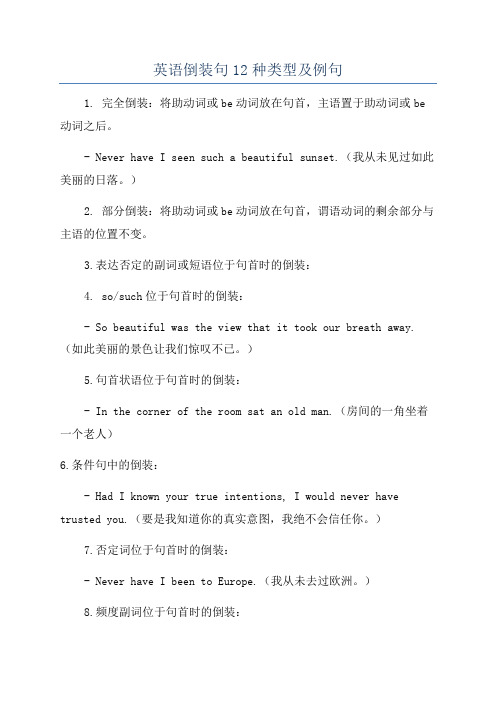
英语倒装句12种类型及例句1. 完全倒装:将助动词或be动词放在句首,主语置于助动词或be 动词之后。
- Never have I seen such a beautiful sunset.(我从未见过如此美丽的日落。
)2. 部分倒装:将助动词或be动词放在句首,谓语动词的剩余部分与主语的位置不变。
3.表达否定的副词或短语位于句首时的倒装:4. so/such位于句首时的倒装:- So beautiful was the view that it took our breath away.(如此美丽的景色让我们惊叹不已。
)5.句首状语位于句首时的倒装:- In the corner of the room sat an old man.(房间的一角坐着一个老人)6.条件句中的倒装:- Had I known your true intentions, I would never have trusted you.(要是我知道你的真实意图,我绝不会信任你。
)7.否定词位于句首时的倒装:- Never have I been to Europe.(我从未去过欧洲。
)8.频度副词位于句首时的倒装:- Rarely do we see such dedication.(我们很少见到如此的奉献精神。
)9.祈使句或祈使句部分的倒装:- Stand up!(站起来!)- Be quiet, please.(请安静。
)10. only位于句首时的倒装:- Only by working hard can you achieve your goals.(只有通过努力工作,你才能实现目标。
)11.地点状语置于句首时的倒装:- In the garden were beautiful flowers.(花园里有美丽的花朵。
)12.宾语置于句首时的倒装:- A love like this I have never felt before.(我之前从未感受过如此的爱。
英语 倒装句

英语倒装句倒装句(Inverted sentence)是英语中一种常见的句子结构,它通常是将谓语动词放在主语之前,或将助动词或情态动词放在主语之前。
倒装句常用于以下几种情况:1. 在以否定词开头的句子中,谓语动词常常放在主语之前,形成倒装句。
例如:- I have never been to Paris. → Never have I been to Paris. - He doesn"t like coffee. → Not only doesn"t he like coffee, but he also hates tea.2. 在以表示地点的副词开头的句子中,谓语动词常常放在主语之前,形成倒装句。
例如:- Here comes the bus.- There goes the bell.3. 在以表示方向的副词或词组开头的句子中,谓语动词常常放在主语之前,形成倒装句。
例如:- Up went the balloon.- In came the cat.4. 在以表示否定意义的副词或词组开头的句子中,不论是否是否定句,谓语动词常常放在主语之前,形成倒装句。
例如:- Never have I seen such a beautiful sunset.- Little did I know that he was planning a surprise party for me.5. 在以“so + 形容词/副词”或“such + 名词”开头的句子中,谓语动词常常放在主语之前,形成倒装句。
例如:- So tired was he that he couldn"t stay awake.- Such was his talent that he became a famous musician.需要注意的是,倒装句并不是所有情况下都适用,而是在特定的语境和句型中使用的。
英语倒装句12种类型及例句
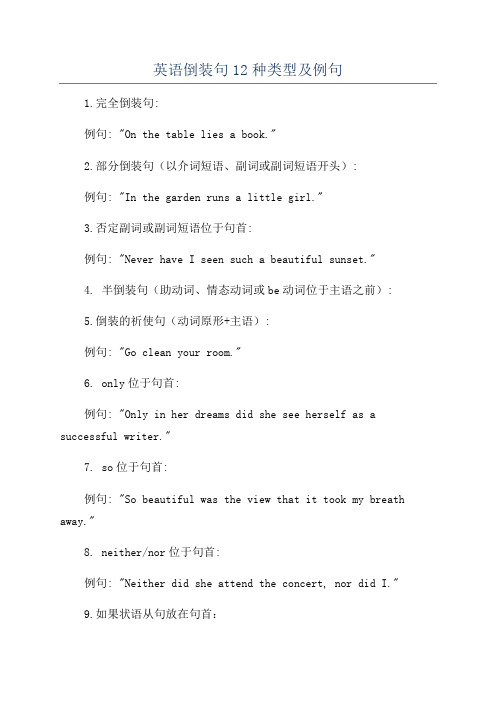
英语倒装句12种类型及例句1.完全倒装句:例句: "On the table lies a book."2.部分倒装句(以介词短语、副词或副词短语开头):例句: "In the garden runs a little girl."3.否定副词或副词短语位于句首:例句: "Never have I seen such a beautiful sunset."4. 半倒装句(助动词、情态动词或be动词位于主语之前):5.倒装的祈使句(动词原形+主语):例句: "Go clean your room."6. only位于句首:例句: "Only in her dreams did she see herself as a successful writer."7. so位于句首:例句: "So beautiful was the view that it took my breath away."8. neither/nor位于句首:例句: "Neither did she attend the concert, nor did I."9.如果状语从句放在句首:10.条件从句位于句首:例句: "Should he fail the exam, he will have to retake the course."11.介词短语或副词短语位于句首:例句: "In the corner sat a small dog."12. or/ nor引导的短语或句子位于句首:。
倒装句的形式和使用
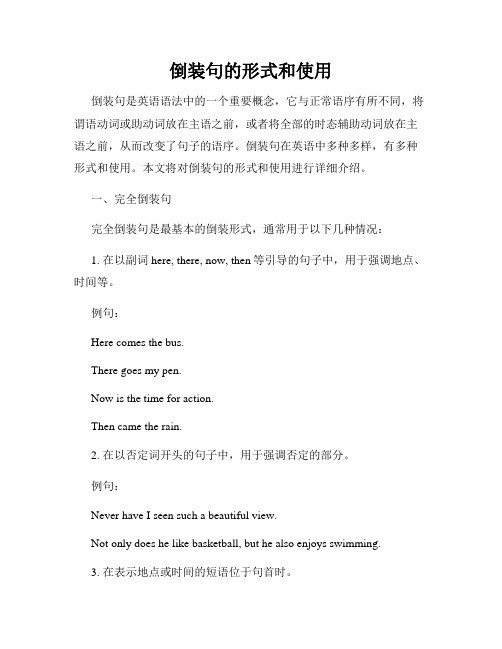
倒装句的形式和使用倒装句是英语语法中的一个重要概念,它与正常语序有所不同,将谓语动词或助动词放在主语之前,或者将全部的时态辅助动词放在主语之前,从而改变了句子的语序。
倒装句在英语中多种多样,有多种形式和使用。
本文将对倒装句的形式和使用进行详细介绍。
一、完全倒装句完全倒装句是最基本的倒装形式,通常用于以下几种情况:1. 在以副词here, there, now, then等引导的句子中,用于强调地点、时间等。
例句:Here comes the bus.There goes my pen.Now is the time for action.Then came the rain.2. 在以否定词开头的句子中,用于强调否定的部分。
例句:Never have I seen such a beautiful view.Not only does he like basketball, but he also enjoys swimming.3. 在表示地点或时间的短语位于句首时。
例句:In the garden stood a tall tree.At the party appeared a famous singer.二、部分倒装句部分倒装句是指将助动词或情态动词放在主语之前,而将主动动词保持不变的倒装形式。
它通常用于以下几种情况:1. 在以否定副词或短语开头的句子中,用于强调否定的部分。
例句:Under no circumstances will I give up.By no means should you ignore his advice.2. 在以only修饰副词、介词短语或状语从句的句子中,用于强调该部分。
例句:Only in this way can we solve the problem.Only by working hard can you achieve success.3. 在以表示“否定”、“否认”、“否则”等词语开头的条件句中。
英语倒装句12种类型
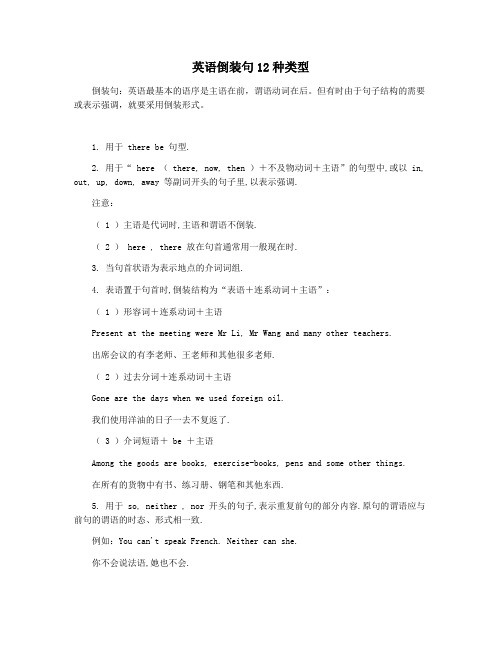
英语倒装句12种类型倒装句:英语最基本的语序是主语在前,谓语动词在后。
但有时由于句子结构的需要或表示强调,就要采用倒装形式。
1. 用于 there be 句型.2. 用于“ here ( there, now, then )+不及物动词+主语”的句型中,或以 in, out, up, down, away 等副词开头的句子里,以表示强调.注意:( 1 )主语是代词时,主语和谓语不倒装.( 2 ) here , there 放在句首通常用一般现在时.3. 当句首状语为表示地点的介词词组.4. 表语置于句首时,倒装结构为“表语+连系动词+主语”:( 1 )形容词+连系动词+主语Present at the meeting were Mr Li, Mr Wang and many other teachers.出席会议的有李老师、王老师和其他很多老师.( 2 )过去分词+连系动词+主语Gone are the days when we used foreign oil.我们使用洋油的日子一去不复返了.( 3 )介词短语+ be +主语Among the goods are books, exercise-books, pens and some other things.在所有的货物中有书、练习册、钢笔和其他东西.5. 用于 so, neither , nor 开头的句子,表示重复前句的部分内容.原句的谓语应与前句的谓语的时态、形式相一致.例如:You can't speak French. Neither can she.你不会说法语,她也不会.6. 为了保持句子平衡,或为了强调表语或状语,或是上下文紧密衔接时.例如: They arrived at a small village, in front of which was a big river.他们来到一个小村庄,村庄前面是条大河.1. 否定副词位于句首时的倒装在正式文体中,never, seldom, rarely, little, hardly, scarcely, no sooner, no longer, nowhere 等含有否定意义的副词若位于句首,则其后要用部分倒装:I shall never forgive him. / Never shall I forgive him. 我永远不会宽恕他。
英语倒装句
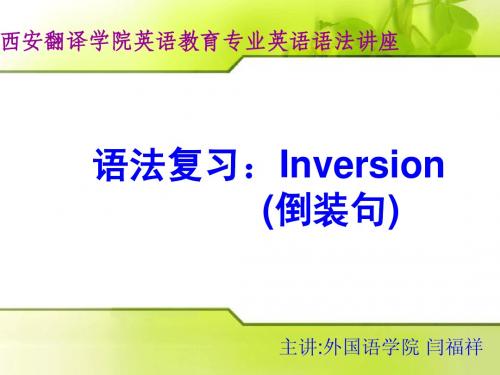
英语倒装句

部分倒装
2. 并列连词Not only…but also…, hardly…when…,no sooner…than…等放句首, 连接两个并列分句时, 第一个分句用部分倒装。(前倒后不倒)
倒装句
Chen 20200403
倒装句
完全倒装 部分倒装
自然语序
主 + V. + 宾
e.g. I love English.
1
2
3
完全倒装
V. + 主
校长来了。
e.g. The headmaster came here.
1
2
3
e.g. Here came the headmaster.321Fra bibliotek部分倒装
12
He is active in personality, and h1e seldom st2ays indoors.
He is active in personality, and seldom does he stay indoors.
212
*若原句中没有助动词,必须根据谓语动词的具 体时态来确定相应的助动词do,does或did。
完全倒装
Exercise
6. A frightening sound came from the valley。 _F_r_o_m__t_h_e_v_a_l_le_y__c_a_m__e_a__f_ri_g_h_t_e_n_in_g__s_o_u_n_d_。 7. A small factory lies in south of the river。 _I_n__s_o_u_t_h_o_f__th_e__r_iv_e_r__li_e_s_a__s_m_a_l_l_f_a_c_to_r_y__。
倒装句七种英语结构
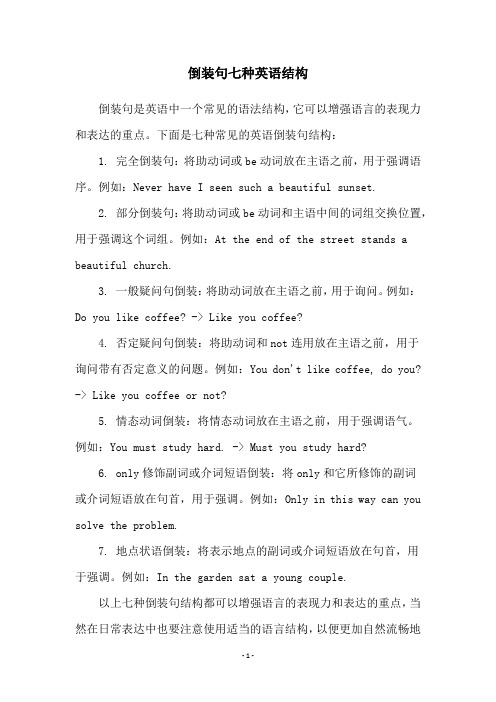
倒装句七种英语结构倒装句是英语中一个常见的语法结构,它可以增强语言的表现力和表达的重点。
下面是七种常见的英语倒装句结构:1. 完全倒装句:将助动词或be动词放在主语之前,用于强调语序。
例如:Never have I seen such a beautiful sunset.2. 部分倒装句:将助动词或be动词和主语中间的词组交换位置,用于强调这个词组。
例如:At the end of the street stands a beautiful church.3. 一般疑问句倒装:将助动词放在主语之前,用于询问。
例如:Do you like coffee? -> Like you coffee?4. 否定疑问句倒装:将助动词和not连用放在主语之前,用于询问带有否定意义的问题。
例如:You don't like coffee, do you? -> Like you coffee or not?5. 情态动词倒装:将情态动词放在主语之前,用于强调语气。
例如:You must study hard. -> Must you study hard?6. only修饰副词或介词短语倒装:将only和它所修饰的副词或介词短语放在句首,用于强调。
例如:Only in this way can you solve the problem.7. 地点状语倒装:将表示地点的副词或介词短语放在句首,用于强调。
例如:In the garden sat a young couple.以上七种倒装句结构都可以增强语言的表现力和表达的重点,当然在日常表达中也要注意使用适当的语言结构,以便更加自然流畅地表达意思。
英语的倒装句
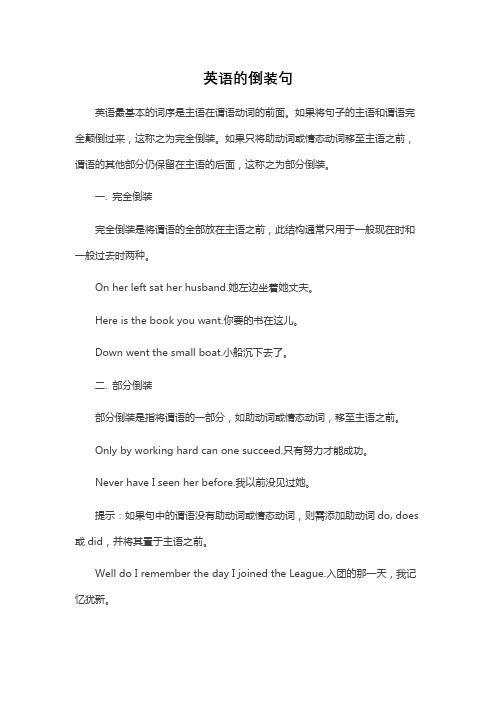
英语的倒装句
英语最基本的词序是主语在谓语动词的前面。
如果将句子的主语和谓语完全颠倒过来,这称之为完全倒装。
如果只将助动词或情态动词移至主语之前,谓语的其他部分仍保留在主语的后面,这称之为部分倒装。
一. 完全倒装
完全倒装是将谓语的全部放在主语之前,此结构通常只用于一般现在时和一般过去时两种。
On her left sat her husband.她左边坐着她丈夫。
Here is the book you want.你要的书在这儿。
Down went the small boat.小船沉下去了。
二. 部分倒装
部分倒装是指将谓语的一部分,如助动词或情态动词,移至主语之前。
Only by working hard can one succeed.只有努力才能成功。
Never have I seen her before.我以前没见过她。
提示:如果句中的谓语没有助动词或情态动词,则需添加助动词do, does 或did,并将其置于主语之前。
Well do I remember the day I joined the League.入团的那一天,我记忆犹新。
Little did I think that he could be back alive .我没有想到他竟能活着回来。
英语倒装句

英语倒装句Company Document number:WUUT-WUUY-WBBGB-BWYTT-1982GT英语倒装句倒装有两种:一将主语和谓语完全颠倒过来,叫做完全倒装。
如:In came a man with a white beard.二只将助动词(包括情态动词)移至主语之前,叫做部分倒装。
如:Only once was John late to class.英语句子的倒装一是由于结构的需要而进行的倒装,二是由于修辞的需要而进行的倒装。
前一种情况,倒装是必须的,否则就会出现语法错误;后一种情况,倒装是选择性的,倒装与否只会产生表达效果上的差异。
一完全倒装的四种主要类型(有地钻状洞动)1. here 和there、now、 then位于句首时的倒装表示地点的here和 there位于句首时,其后用完全倒装形式。
这类倒装句的谓语通常是动词be和come, go等表示移动或动态的不及物动词:Here’s Tom. 汤姆在这里。
There’s Jim. 吉姆在那儿。
Here comes the bus. 公共汽车来了。
There goes the bell. 铃响了。
There goes the last train. 最后一班火车开走了。
【注意】(1)以上倒装句中的谓语动词come和go不能用进行时态,即不能说Here is coming the bus。
(2) 若主语为代词,则不倒装:Here I am. 我在这儿。
/ 我来了。
Here it comes. 它来了。
(3) 其中的动词有时也可能是stand, lie, live等表示状态的动词(表示存在):There stood a desk against the wall. 靠墙放着一张书桌。
Once upon a time there lived a man known by the name of Beef. 从前有个人名叫比夫。
英语倒装金句100句

英语倒装金句100句英语中的倒装句是一种常用的表达方式,它能够使句子更加生动有力。
本文将为您介绍100个常用的英语倒装金句,欢迎阅读。
1. Hardly had I arrived at the station when the train departed.2. Never have I seen such a beautiful sunset.3. Not until she left did I realize how much I missed her.4. Only in this way can we solve the problem effectively.5. Little did he know that his life was about to change forever.6. Under no circumstances should you give up on your dreams.7. Seldom does he express his emotions openly.8. Rarely have I encountered such a challenging task.9. No sooner had the teacher finished speaking than the bell rang.10. In no way am I suggesting that we should ignore the issue.11. At no time during the experiment did the machine malfunction.12. Never before have I felt so alive.13. Only when we are willing to change can we grow.14. Little do they realize the impact of their actions.15. Under no condition should you disclose the confidential information.16. Seldom have I witnessed such dedication and perseverance.17. Rarely do I find the time to relax and enjoy a good book.18. Not until recently did I discover my true passion.19. Only by working together can we achieve our goals.20. Hardly had I begun to speak when she interrupted me.21. Never have I encountered such a difficult problem before.22. Not until tomorrow will they be able to complete the project.23. Only in his presence do I feel truly at ease.24. Little did she suspect that her life was about to change forever.25. Under no circumstances should you give up on your dreams.26. Seldom does he admit that he is wrong.27. Rarely have I seen such a beautiful landscape.28. No sooner had I finished my work than the phone rang.29. In no way am I suggesting that we should ignore the issue.30. At no time during the performance did the audience grow bored.31. Never before have I encountered such a kind-hearted person.32. Only when we face our fears can we overcome them.33. Little do they realize the impact of their words.34. Under no condition should you reveal the password to anyone.35. Seldom have I experienced such a sense of accomplishment.36. Rarely do I have the opportunity to travel abroad.37. Not until he apologized did I forgive him.38. Only by following these steps can you achieve success.39. Hardly had we arrived at the airport when the flight was canceled.40. Never have I seen such a breathtaking view.41. Not until the last moment did she make up her mind.42. Only with your support can we make a difference.43. Little did they know that their lives were about to change forever.44. Under no circumstances should you compromise your values.45. Seldom does he ask for help when he needs it.46. Rarely have I encountered such a challenging task.47. No sooner had I left the house than it started to rain.48. In no way am I suggesting that we should give up.49. At no time during the meeting did the discussion become heated.50. Never before have I felt so inspired.51. Only when we take risks can we achieve great things.52. Little do they understand the complexity of the situation.53. Under no condition should you reveal your personal information.54. Seldom have I encountered such a generous offer.55. Rarely do I have the opportunity to meet such interesting people.56. Not until yesterday did I realize the importance of communication.57. Only by working together can we solve this problem.58. Hardly had I finished my meal when the phone rang.59. Never have I witnessed such dedication.60. Not until the last minute did he change his mind.61. Only through hard work can we achieve our goals.62. Little did she know that her life was about to change forever.63. Under no circumstances should you give up on your dreams.64. Seldom does he talk about his personal life.65. Rarely have I seen such a beautiful sight.66. No sooner had I arrived at the station than the train left.67. In no way am I suggesting that we should ignore the problem.68. At no time during the interview did he mention his previous experience.69. Never before have I felt so inspired.70. Only when we face our fears can we overcome them.71. Little do they realize the impact of their actions.72. Under no condition should you reveal your password.73. Seldom have I witnessed such determination.74. Rarely do I have the opportunity to travel.75. Not until she left did I realize how much I missed her.76. Only by working together can we find a solution.77. Hardly had I finished my work when the power went out.78. Never have I been so impressed by someone's talent.79. Not until the last minute did she decide to go.80. Only with your help can we make a difference.81. Little did they suspect that their lives were about to change forever.82. Under no circumstances should you give up on your dreams.83. Seldom does he take the time to appreciate the beauty around him.84. Rarely have I seen such dedication and commitment.85. No sooner had I started reading the book than I was hooked.86. In no way am I suggesting that we should abandon our principles.87. At no time during the concert did the audience grow bored.88. Never before have I felt so alive.89. Only when we step out of our comfort zone can we grow.90. Little do they realize the impact of their choices.91. Under no condition should you share your passwords with others.92. Seldom have I encountered such a challenging task.93. Rarely do I have the opportunity to meet such interesting people.94. Not until yesterday did I realize how much I loved him.95. Only by working together can we achieve success.96. Hardly had I begun my presentation when the fire alarm went off.97. Never have I seen such a magnificent sight.98. Not until the last moment did she reveal her true feelings.99. Only in this way can we make a difference.100. Little did they know that their lives were about to change forever.以上便是100个常用的英语倒装句金句,它们能够让您的英语表达更加生动有力。
倒装句型结构及用法英语

倒装句型结构及用法英语倒装句是指在句子中调换主语和谓语动词的正常语序,或将动词提前至主语之前的结构。
这种结构在英语中有多种用法,以下是一些常见的倒装句型及其用法:完全倒装:结构:倒装句的完全形式是将助动词或情态动词放在主语之前。
例子:Never have I seen such a beautiful sunset.(我从未见过如此美丽的日落。
)否定副词倒装:结构:当否定副词放在句首时,需要对句子进行倒装。
例子:Rarely does he complain about his workload.(他很少抱怨工作负担。
)表示方向、地点的副词倒装:结构:表示方向、地点的副词位于句首时,句子需要进行倒装。
例子:Up the hill ran the children.(孩子们跑上了山。
)only 修饰副词、介词短语时的倒装:结构:当"only" 修饰副词或介词短语时,通常需要将其置于句首并进行倒装。
例子:Only after finishing his homework can he go out.(只有完成作业,他才能出去。
)so 和neither 引导的倒装句:结构:当"so" 或"neither" 用于引导对等结构的倒装句时,主谓语序颠倒。
例子:"I love pizza." - "So do I."("我喜欢披萨。
" - "我也是。
")倒装问句:结构:在一般陈述句的基础上,将助动词或情态动词提前至主语之前,形成疑问句。
例子:You have finished your homework. →Have you finished your homework?这些是一些常见的倒装句型及其用法。
需要注意的是,并非所有情况下都适用倒装结构,而是要根据具体语境和语法规则来判断。
英语倒装句(最全面_最简洁)
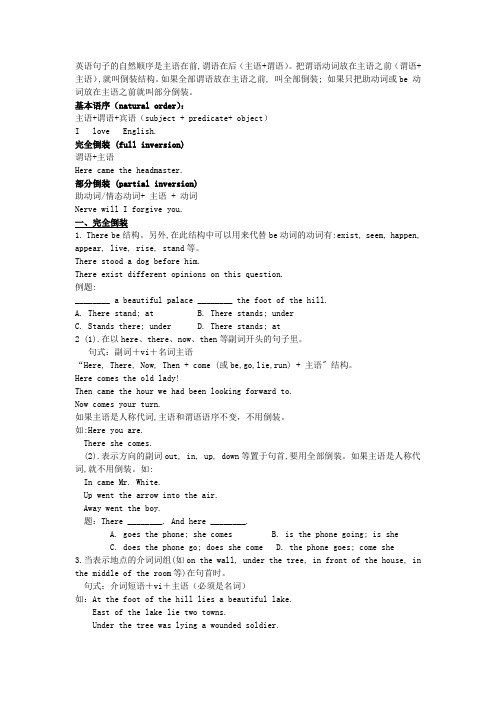
英语句子的自然顺序是主语在前,谓语在后(主语+谓语)。
把谓语动词放在主语之前(谓语+主语),就叫倒装结构。
如果全部谓语放在主语之前, 叫全部倒装; 如果只把助动词或be 动词放在主语之前就叫部分倒装。
基本语序(natural order):主语+谓语+宾语(subject + predicate+ object)I love English.完全倒装 (full inversion)谓语+主语Here came the headmaster.部分倒装 (partial inversion)助动词/情态动词+ 主语 + 动词Nerve will I forgive you.一、完全倒装1. There be结构。
另外,在此结构中可以用来代替be动词的动词有:exist, seem, happen, appear, live, rise, stand等。
There stood a dog before him.There exist different opinions on this question.例题:________ a beautiful palace ________ the foot of the hill.A. There stand; atB. There stands; underC. Stands there; underD. There stands; at2 (1).在以here、there、now、then等副词开头的句子里。
句式:副词+vi+名词主语“Here, There, Now, Then + come (或be,go,lie,run) + 主语" 结构。
Here comes the old lady!Then came the hour we had been looking forward to.Now comes your turn.如果主语是人称代词,主语和谓语语序不变,不用倒装。
英语倒装句12种类型
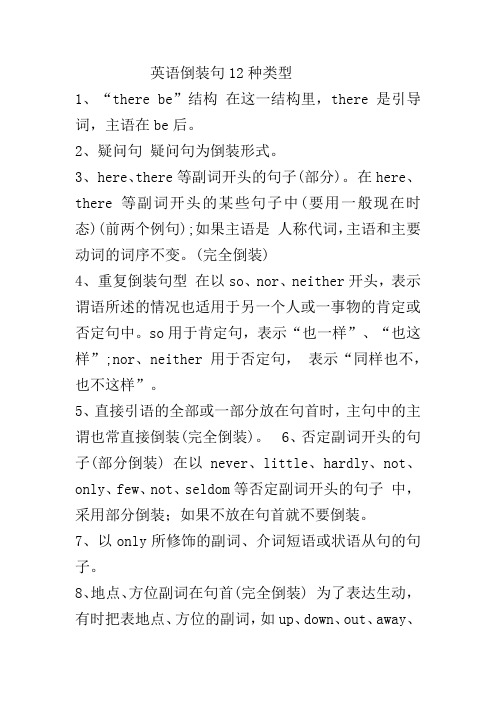
英语倒装句12种类型1、“there be”结构在这一结构里,there是引导词,主语在be后。
2、疑问句疑问句为倒装形式。
3、here、there等副词开头的句子(部分)。
在here、there等副词开头的某些句子中(要用一般现在时态)(前两个例句);如果主语是人称代词,主语和主要动词的词序不变。
(完全倒装)4、重复倒装句型在以so、nor、neither开头,表示谓语所述的情况也适用于另一个人或一事物的肯定或否定句中。
so用于肯定句,表示“也一样”、“也这样”;nor、neither用于否定句,表示“同样也不,也不这样”。
5、直接引语的全部或一部分放在句首时,主句中的主谓也常直接倒装(完全倒装)。
6、否定副词开头的句子(部分倒装) 在以never、little、hardly、not、only、few、not、seldom等否定副词开头的句子中,采用部分倒装;如果不放在句首就不要倒装。
7、以only所修饰的副词、介词短语或状语从句的句子。
8、地点、方位副词在句首(完全倒装) 为了表达生动,有时把表地点、方位的副词,如up、down、out、away、in等放在句首,同时把谓语动词放在主语之前。
若主语为人称代词,主语和谓语动词的位置不变,只将副词放在句首。
(完全倒装)9、虚拟结构中在虚拟结构中,条件从句的谓语含有were、had和should这三个词是,可省去if,将这些词移至主语之前。
10、as引导的让步状语从句 as引导让步状语从句时要倒装(形容词/副词/名词/动词+as+主语+谓语)。
11、祝愿的句子用于某些表示祝愿的句子里。
12、So+形容词、副词及such置于句首时。
英语倒装大全
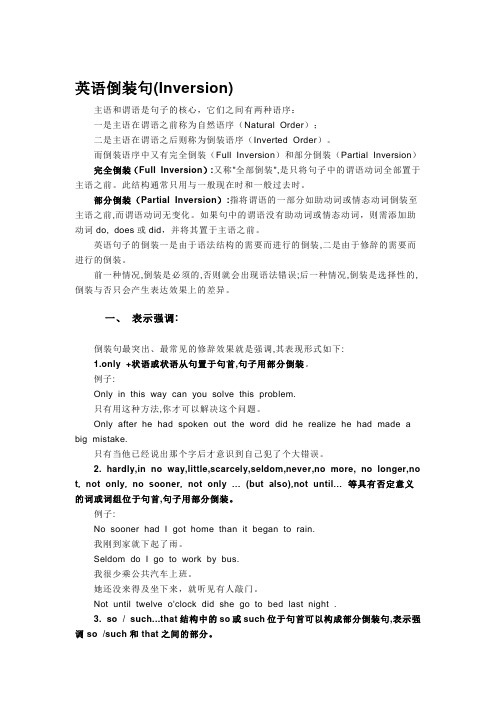
英语倒装句(Inversion)主语和谓语是句子的核心,它们之间有两种语序:一是主语在谓语之前称为自然语序(Natural Order);二是主语在谓语之后则称为倒装语序(Inverted Order)。
而倒装语序中又有完全倒装(Full Inversion)和部分倒装(Partial Inversion)完全倒装(Full Inversion):又称"全部倒装",是只将句子中的谓语动词全部置于主语之前。
此结构通常只用与一般现在时和一般过去时。
部分倒装(Partial Inversion):指将谓语的一部分如助动词或情态动词倒装至主语之前,而谓语动词无变化。
如果句中的谓语没有助动词或情态动词,则需添加助动词do, does或did,并将其置于主语之前。
英语句子的倒装一是由于语法结构的需要而进行的倒装,二是由于修辞的需要而进行的倒装。
前一种情况,倒装是必须的,否则就会出现语法错误;后一种情况,倒装是选择性的,倒装与否只会产生表达效果上的差异。
一、表示强调:倒装句最突出、最常见的修辞效果就是强调,其表现形式如下:1.only +状语或状语从句置于句首,句子用部分倒装。
例子:Only in this way can you solve this problem.只有用这种方法,你才可以解决这个问题。
Only after he had spoken out the word did he realize he had made a big mistake.只有当他已经说出那个字后才意识到自己犯了个大错误。
2. hardly,in no way,little,scarcely,seldom,never,no more, no longer,no t, not only, no sooner, not only … (but also),not until… 等具有否定意义的词或词组位于句首,句子用部分倒装。
英语的倒装句句条件初中

英语的倒装句句条件初中英语的倒装句有以下几种情况:1. 完全倒装:将助动词或情态动词放在主语之前,构成完全倒装结构。
如:- Never have I seen such a beautiful sunset. 我从未见过这么美丽的日落。
- Rarely do we have the opportunity to travel abroad. 我们很少有机会出国旅游。
- Not only is he intelligent, but he is also hardworking. 他不仅聪明,而且勤奋。
2. 部分倒装:把谓语动词中的一部分放在主语之前,构成部分倒装结构。
如:- Hardly had she finished her work when the boss came in. 她刚刚完成工作,老板就进来了。
- Under no circumstances should you give up. 在任何情况下都不应该放弃。
- With a smile on his face, Tom walked into the room. 汤姆脸上带着微笑走进房间。
3. 带有否定意义的副词或短语放在句首时的倒装:如:- Never before have I tasted such delicious food. 我从未尝过这么美味的食物。
- Little did he know that he was going to be fired. 他并不知道自己即将被解雇。
- Seldom have I seen such a kind-hearted person. 我很少见到如此善良的人。
注意:主语必须是名词或代词,不能是动词-ing形式或不定式。
同时,在倒装句中,一般情况下要将情态动词或助动词放在主语之前,只有实义动词才能放在主语之后。
英语中的倒装句结构有哪些

英语中的倒装句结构有哪些?在英语中,倒装句指的是将谓语动词或助动词置于主语之前的句子结构。
倒装句可以用于不同的语法结构和句型中。
下面是英语中常见的几种倒装句结构:1. 完全倒装句(Full Inversion):-以副词或介词短语开头的句子:Adverbial inversion- Never have I seen such a beautiful sunset.(我从未见过如此美丽的日落。
)- In the garden sat a little girl.(花园里坐着一个小女孩。
)-以表示否定的副词或短语开头的句子:Negative inversion- Not only did she pass the exam, but she also got the highest score.(她不仅通过了考试,而且还得到了最高分。
)- Under no circumstances should you give up.(无论如何,你都不应该放弃。
)-以表示条件的副词或短语开头的句子:Conditional inversion- Should you need any assistance, please let us know.(如果你需要任何帮助,请告诉我们。
)- Were he to win the lottery, he would buy a new car.(如果他中了彩票,他会买一辆新车。
)2. 部分倒装句(Partial Inversion):-以否定副词开头的句子:Negative adverbial inversion- Never have I been so insulted in my life.(我一生中从未受过如此侮辱。
)- Rarely do I go to bed before midnight.(我很少在午夜前上床睡觉。
)-以表示方向或地点的副词短语开头的句子:Adverbial phrase inversion- Up the hill ran the children.(孩子们跑上山。
英语语法倒装句

英语语法倒装句倒装是一种语法手段,用于表示一定的句子结构或强调某一句子成分。
倒装句有两种完全倒装和部分倒装。
1 倒装句之全部倒装全部倒装是只将句子中的谓语动词全部置于主语之前。
此结构通常只用与一般现在时和一般过去时。
常见的结构有1) here, there, now, then, thus等副词置于句首, 谓语动词常用be, come, go, lie, run。
There goes the bell.Then came the chairman.Here is your letter.2) 表示运动方向的副词或地点状语置于句首,谓语表示运动的动词。
Out rushed a missile from under the bomber.Ahead sat an old woman.注意上述全部倒装的句型结构的主语必须是名词,如果主语是人称代词则不能完全倒装。
Here he comes.Away they went.2 倒装句之部分倒装部分倒装是指将谓语的一部分如助动词或情态倒装至主语之前。
如果句中的谓语没有助动词或情态动词,则需添加助动词do, does或did,并将其置于主语之前。
1)句首为否定或半否定的词语,如no, not, never, seldom, little, hardly, at no time, in no way, not until… 等。
Never have I seen such a performance.Nowhere will you find the answer to this question.Not until the child fell asleep did the mother leave the room.当Not until引出主从复合句,主句倒装,从句不倒装。
注意如否定词不在句首不倒装。
I have never seen such a performance.The mother didnt leave the room until the child fell asleep.典型例题1)Why cant I smoke here?At no time___ in the meeting-roomA. is smoking permittedB.smoking is permittedC. smoking is it permittedD.does smoking permit答案A. 这是一个倒装问题。
- 1、下载文档前请自行甄别文档内容的完整性,平台不提供额外的编辑、内容补充、找答案等附加服务。
- 2、"仅部分预览"的文档,不可在线预览部分如存在完整性等问题,可反馈申请退款(可完整预览的文档不适用该条件!)。
- 3、如文档侵犯您的权益,请联系客服反馈,我们会尽快为您处理(人工客服工作时间:9:00-18:30)。
完全倒装用法归纳倒装通常分可为完全倒装(谓语置于主语前)和部分倒装(使用一般疑问句的形式)。
而完全倒装通常又有两种情况:1. 在描述动作的句子,为了描述生动,增强修饰效果,常将副词out, in, down, up, away, off, here, there, now, then, next等位于句首,从而引起倒装。
如:In came the teacher. 老师进了来。
There goes the bell. 响铃了。
Up went the arrow into the air. 箭飕地一下声飞到了空中。
2. 为了使句子平衡或上下文联系紧密,常将表语或地点状语(多为介词短语)置于句首,从而引起倒装。
如:By the window sat a girl. 窗子边坐着一个女孩。
At the top of the hill stands a weather station. 山顶上有一个气象站。
注意:若主语是代词,则不能倒装。
如:There he goes. 他走了。
Behind the counter she stood. 她站在柜台后。
英语部分倒装大归纳1.疑问句中,一般须部分倒装。
如:How long have you been here? 你来这儿多长时间了?What do you think about the movie? 你认为这场电影怎么样?Why doesn’t he come here? 他为什么没来这儿?注意:当对句子的主语提问时,一般不用倒装语序。
如:Who did it just now? 刚才谁干的?What happened last night? 昨天晚上发生了什么事?2.否定词no, none, neither, nor, nobody, nothing, never,或半否定词hardly, seldom, scarcely, barely, little, few, 否定词的短语not until, by no means, not only…but also…, in no way, neither …nor…, in no time, no sooner…than…, hardly…when…, under no circumstances及频度状语副词every day, every other day, many a time, often等位于句首时,一般须部分倒装。
如:Neither do I know him. 我也不认识他。
No word did he say before he left. 他一句话没说就走了。
Little did I know about it. 我对它了解得不多。
Not only did he come, but also he brought us good news. 他不但来了,而且给我们带来了好消息。
Often did he come here with a good smile on his face. 他来这里时,脸上挂着笑容。
3. Only + 状语,置于句首时,一般须用部分倒装。
如:Only when I got there did I know the truth. 我只有到那里时才知道事情的真相。
Only in the morning can you meet him. 你只有在早晨见到他。
注意:(1) Only + 状语不在句首时,不可倒装,如:I wrote to him only yesterday. 我就在昨天给它取了封信。
(2) Only + 名词做主语时,不可倒装。
如:Only Li Lei can answer this question. 只有李蕾能回答这个问题。
4. as / though引导让步状语从句时,一般须用部分倒装。
如:Old as / though he is, he works like a young man. 尽管他很老了,但他工作起来却像个年轻人。
Hard as / though he was working, he didn’t pass the exam. 虽然他一直在努力学习,但他还是没有通过那次考试。
Try again as / though he will, he can’t succeed. 尽管他还会再试一试,但是它不会成功。
as / though引起的倒装分三种情况:表语、动词原形及状语的倒装。
(1)表语的倒装。
一般直接将表语提前到句首,若表语是带不定冠词a / an的单数可数名词,倒装后,不定冠词a / an须被省略。
如:Fine as / though he looks, he is ill with some serious diseases.Child as / though he is, he knows much about the society.(2) 原形动词的倒装。
A. 动词前面带有情态动词may, might, will, would, can, could等时,只将行为动词提到句首,而这些情态动词保留在原处。
B. 若动词前面没有情态动词时,应在动词原来的位置加上助动词do的适当形式。
C. 用于这一句型的动词一般是不及物动词,而不能是系动词或及物动词。
如:Swim as / though he can, he can’t swim so far. 尽管他会游泳,但是他游不得那么远。
Run as / though he did, he didn’t run fast enough to catch the bus. 虽然他跑,但是他跑得不够快而没有赶上汽车。
(3) 状语倒装。
如:In the classroom as / though he stays, he doesn’t read his texts. 尽管他呆在教室里,但他不读书。
Carefully as / though he worked, he made some mistakes. 尽管他工作很细心,但还是除了一些差错。
5. may用来表示祝愿时,一般用部分倒装。
如:May you have a good journey. 祝你旅途愉快。
May you succeed. 祝你成功。
6.当虚拟条件句的谓语含有were, had, should时,可将if省略,而将were, had, should 提到句首,形成部分倒装。
如:Were he here, we would have no difficulty with it. 要是他在这儿的话,我们就不会有难处了。
Had you worked hard, you would have finished it early. 要是你工作努力的话,你将早就完成了。
7.当so 用来连接不同的人或物具有相同的情况时,可用部分倒装。
如:—Tom can speak Chinese. 汤姆会讲汉语。
—So can Mary. 玛丽也会讲汉语。
—Mr. Li has gone to America. 李先生去美国了。
—So has Mrs. Li. 李夫人也去美国了。
但是,若是对同一个人或事的情况表示肯定而重复时,不能倒装。
如:—Li Lei is good at his lessons. 李蕾的功课学得好。
—So he is. 他的确学得好。
—Wei Fang went to the cinema last night. 魏方昨晚去看过电影。
—So she did. 她的确去看过。
8.结构so…that…/ such…that…引导状语从句,当so或such提到句首时,主句须用倒装语序。
如:So interesting is that story that everyone wants to read it. 那个故事那么有趣,大家都想看。
So good a girl is she that we all like her. 她是一个如此好的女孩,我们大家都喜欢她。
(比较) Such a good girl is she that we all like her. 她是一个如此好的女孩,我们大家都喜欢她。
9.感叹句中的倒装。
如:Isn’t it beautiful! 难道还不漂亮!Aren’t you content with it! 难道还不知足!涉及not only…but also…的部分倒装not only…but also…前后连接两个句子时,not only后的句子要用部分倒装,但but also 后的分句不用倒装。
如:Not only did he come, but he saw her. 他不仅来了,而且还见到了她。
Not only does she speak Spanish, (but) she also knows how to type. 她不但会说西班牙语,还会打字呢。
Not only is he a teacher, but he is also a poet. 他不仅是一位教师,而且是一位诗人。
Not only did he speak more correctly, but he spoke more easily. 不仅他讲得更正确,也讲得更不费劲了。
Not only did they present a musical performance, but they also gave a brief introduction to the history of Western brass instruments. 他们不但做了音乐表演,而且简短地介绍了西方铜管乐器的历史。
非谓语动词置于句首的倒装有时为了强调,可将谓语部分的现在分词、过去分词或不定式置于句首,从而构成倒装。
如:Buried in the sands was an ancient village. 一个古老的村庄被埋在这沙土之中。
Standing beside the table was his wife. 站在桌旁的是他的妻子。
To be carefully considered are the following questions. 下列问题要仔细考虑。
英语哪些成分可以省略1. 省略主语(You) Help yourself to some fish, please. 请随便吃些鱼。
(I) Beg your pardon? 请再讲一遍。
(You) Cheer up. 振作起来。
(I) Thank you for telling me about it. 谢谢你告诉我这件事情。
